| |
Lord
Kitchener's War or the Gold War lasted from 1899 to 1902. |
|
Lord
Kitchener's War or the Gold War was the first war of the bloody 20th
century. It pitted the might of the British Empire against a small group
of Dutch farmers. Boer is simply the Dutch word for FARMER.
Diamonds
were discovered in South Africa in 1867 and gold in 1872. By 1897 South
Africa was the world's largest exporter of gold.
The
golden rule states that "whoever has the gold; makes the rules."
The Boer War was all about the Bank of England gaining a complete monopoly
on South African gold. In the 16th century, the brutal Spanish Empire
committed a similar genocide to gain a monopoly on New World gold....Only
Heroic Holland stood in the way of
Spanish global hegemony.
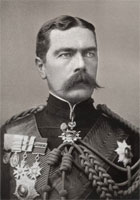
Lord Kitchener circa 1900.
|
|
The
Boer War was a dress rehearsal for World War I.
Kitchener
ended up commanding all the British forces in South Africa,
and he was the architect of the brutal concentration camps
for women and children. |
|
|
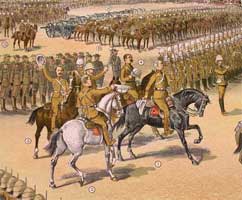 Kitchener riding
a white horse to distinguish him from the rest of the
generals.
Kitchener riding
a white horse to distinguish him from the rest of the
generals. |
Most
of the generals that served with Lord Kitchener in the brutal gold war
went on to serve in World War I.
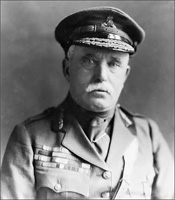
Field Marshall French
(1852–1925).
|
| |
Field
Marshall French commanded the token British Expeditionary
Force in World War I.
He
was relieved in 1915 and replaced by Field Marshall Haig.
Haig is known as the "Butcher
of the Somme." |
|
|
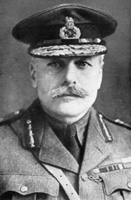
Field Marshall Haig
(1861–1928 .
|
Sir Ian Hamilton
led the disastrous Gallipoli Campaign for Lord Kitchener. The Campaign
was a side show that diverted soldiers from the hard pressed French
on the Western Front.
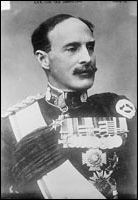
Sir Ian Hamilton
(1853–1947).
|
| |
General
Ian Hamilton led the disastrous Gallipoli Campaign.
Lord
Baden-Powell (the Boy-Man) did not serve in WWI because
he was busy founding the Boy Scouts Movement.
Powell
was an acknowledged spy; he even wrote a book about spying
entitled My
Adventures As A Spy.
|
|
|

Colonel Robert Baden-Powell
(1857–1941).
|
Before
World War II, Baden-Powell's Boy Scouts Movement was the model for the
Hitler Youth in Germany!! It's GREAT that boys learn survival skills,
but without a thorough knowledge of Sword of the Spirit, they are like
the Boers confronting the might of the British Empire.
The
British mobilized 500,000 men to fight the farmers!!
The British mobilized
a vast army to fight the Dutch farmers. Lord Kitchener was their most
experienced soldier. The British wholly underestimated the Boers and
they believed that just the sight of the British Army would make them
run.
Men came from as
far away as Australia and New Zealand to "serve their Queen"
who was too old to even know or care what was happening in the United
KINGdom!!

Troops of the Australian contingent
marching through Melbourne.
|
| |
All
over the Empire the battle cry was "God save the Queen"
who was too old to know or even care about the genocide
of the Boers that was done in her name. |
|
|
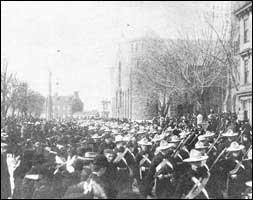
Men of the first Canadian contingent
leaving for South Africa.
|
Troop
strength finally reached a total of 500,000 men from all parts of the
British Empire.
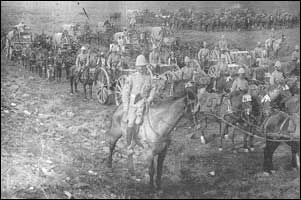 Vast British
Army deploying for battle.
Vast British
Army deploying for battle.
|
|
The
British believed that just the sight of the army
would scare the Boers.
This
was the first example of "shock and awe."
|
|
|
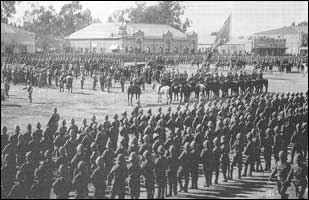
The invading host drawn up in dread array.
|
This
vast army used state of the art military technology. One such weapon
was the newly invented Maxim machine gun.
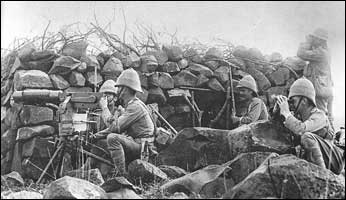
British
troops laying down a deadly fire on the
farmers with their Maxim machine gun. |
| |
One
of the deadliest weapons in the British arsenal was the
newly invented Maxim machine gun. |
|
|
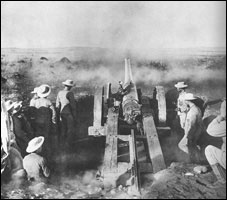
4.7 inch British naval gun
shelling the farmers. |
Despite the overwhelming
numbers and the latest killing technology, the Boers fought heroically
against the British invaders.
The
farmers fought heroically against the British invaders!!
The
Boers were never able to field more that 60,000 men but they fought
heroically to defend their homeland.
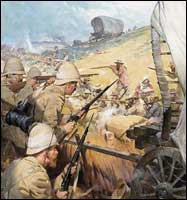
The brave Boers went toe to toe
with the British invaders.
|
| |
The
Boers were a citizen militia and very familiar with firearms.
They
made the British pay a heavy price for invading their country
and stealing their gold. |
|
|
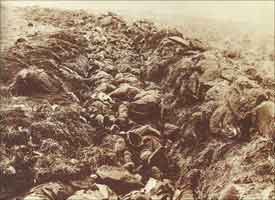
Thousands of dead British invaders
were left to rot in trenches.
|
The
real heroes of the resistance were the individual Boers who displayed
remarkable courage and resourcefulness.
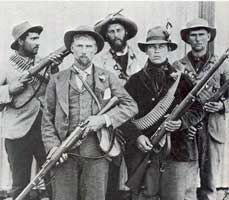
Brave
Boer commando prepare
to defend their country.
|
| |
With
a Bible in one hand and a rifle in the other, the brave
farmers confronted the overwhelming might of the British
Empire, and made them pay a heavy price for their gold lust!!
|
|
|
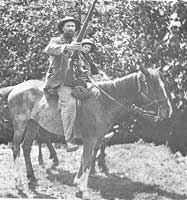
Boer father and son prepare
to expel the invaders.
|
With
the cream of the British Army turned into whipped cream,
Lord Kitchener resorted to a diabolical scorched earth policy.
Lord
Kitchener erected concentration camps for women and children!!
Despite
signing the Hague Convention, the British resorted to a scorched earth
policy in order to subdue the Boers. Homes were burned to the ground,
cattle were slaughtered, and the women and children carted off to concentration
camps.
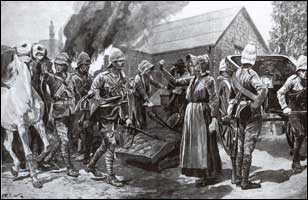
British
soldiers looting and
burning a Boer farm. |
| |
The
British army behaved like BEASTS as this was the fruit
of Darwinian evolution!!
After
looting and burning their homes, Boer women and children
were herded off to concentration camps.
|
|
|
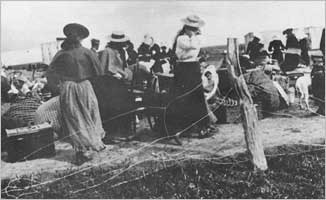
Boer women entering a
concentration camp. |
In
the most unkindest cut of all, the women were asked to sign a piece
of paper pleading with their husbands to surrender. Despite terrible
suffering, not one woman relented and signed the paper.
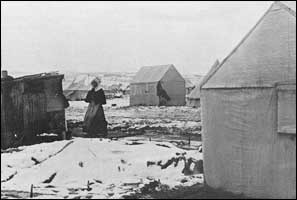
Women and
children were forced to live in
flimsy tents with snow on the ground.
|
| |
South
Africa can be very cold in the winter, and the winter of
1901 was unusually cold and rainy.
The
women and children were forced to live in flimsy tents.
|
|
|
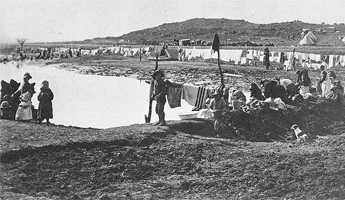
Sanitary facilities were horrendous, leading to
death from typhoid and dysentery. |
Boer
children died by the thousands from dysentery, typhoid, and malnutrition.
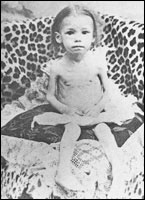 Young girl
victim of malnutrition.
Young girl
victim of malnutrition.
|
| |
A
total of 45 genocide concentration camps were set up with
the largest containing 5,000 women and children.
The
Holohoax in Germany would later be used as a smokescreen
to hide these war crimes!!
|
|
|
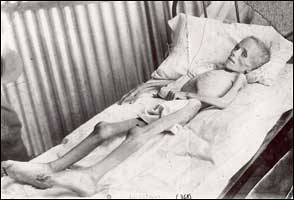
Camp inmate Lizzie Van Zyl
dying from malnutrition. |
By
1900, true Christianity was not completely extinct in Britain. In December
1899, an angel of mercy named Emily Hobhouse arrived in South Africa
on a mission of mercy.
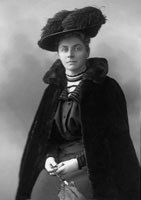 Emily Hobhouse
Emily Hobhouse
(1860 - 1926).
|
| |
By
1900, true Christianity was not completely extinct in Britain.
Emily
Hobhouse was an angel of mercy who tried to bring relief
to the starving concentration camp inmates. |
|
|
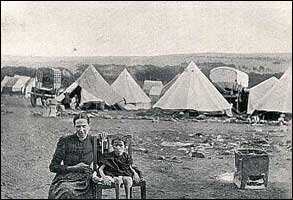
Emily comforting a young dying girl. |
After
Emily arrived in South Africa, she sought permission from Lord Kitchener
to visit the camps. Kitchener rebuked her sternly so she turned to the
governor, Lord Milner.
Milner
was more cooperative and the first camp she visited was named Bloemfontein.
Here is her eyewitness report of conditions in the camp:
My
first visit to the camp at Bloemfontein after the lapse of a few weeks
was a great shock. The population had doubled, and had swamped the
effect of improvements which could not keep pace with the numbers
to be accommodated. Sickness was increasing, and the aspect of the
people was forlorn in the extreme. Disease and death were stamped
upon their faces. Many whom I had left hale and hearty, full in figure
and face, had undergone such a change that I could not recognise them.
I realised how camp life under these imperfect conditions was telling
upon them, and no impartial observer could have failed to see what
must ensue, unless nurses, doctors, workers, and above all extra food,
clothing, and bedding, could be poured out in abundance and without
delay. I sought the Deputy Administrator, and represented to him the
death-rate already worked out in the adjoining camp at 20 per cent.,
and asked if nothing could be done to stop the influx of people. He
replied that he believed that all the people in the entire country,
with the exception of towns on the line, were to be brought in.
His kindness and courtesy often encouraged me to put before him not
only the bodily needs of the women, but other troubles or punishments
which weighed upon them, which seemed unnecessarily severe, and appeared
to be creating sores which even time would not have power to heal.
His policy was no doubt dictated from higher sources, his humanity
too evidently crippled by lack of means. My fund was but a drop in
the ocean of such a need. (Hobhouse, The Brunt of the War and
Where it Fell, pp. 122-123).
Emily
discovered that a total of 45 concentration camps existed throughout
South Africa; most of them with the same appalling conditions as Bloemfontein.
This
war was a public relations nightmare for the British, so to deflect
criticism of their brutal behavior, they invented a "Jewish"
holocaust with "Jewish" concentration camp inmates.
The
farmers received no help from any nation!!
Apart from a small
group of volunteers from the U.S., France, and Holland, no nation offered
any military help to the Boers. Boer president Paul Kruger traveled
to Europe in 1900 but all he received from the Europeans was sympathy.
Paul Kruger appealed
to the German Kaiser for help but the Kaiser could render him no assistance
because he had no navy!!
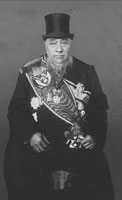
Paul Kruger
(1825–1904). |
| |
Paul
Kruger was president of the South African Republic from
1883 to 1900.
According
to his biographers, Kruger believed that the earth was flat,
and he got that belief from reading the Bible!!
Is
that no less stupid than believing that the earth rotates
on its axis every 24 hours?? |
|
|
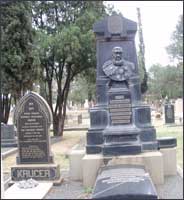
Paul Kruger's grave in Pretoria,
South Africa. |
President Kruger
travelled to Europe in 1900 seeking military help for his farmers. No
nation offered him any assistance and the German Kaiser refused to even
meet with him:
But Leyds was
not really surprised. Britain had largely ignored the French demonstrations,
but a similar sort of thing in Germany would be a different matter.
Instead of helping the Boers, and to make up for past indiscretions,
the Kaiser in fact sent suggestions to England as to how the Boers
could be vanquished by a scorched earth policy, concentration camps,
drives, and so on, measures actually adopted by Lord Kitchener who
succeeded Lord Roberts. To his critics the Kaiser
explained that he was in no position to go to war with England because
he did not have a proper fleet, so it was best to befriend
her. Leyds did not know all this, but he had hoped that Kruger's actual
arrival would clarify the situation. Now it had been clarified, and
he called off a German tour. (Meintjes, President Paul Kruger,
p. 254).
Where did the Kaiser
get the money to build a vast fleet and challenge the British
Empire in 1914? Obviously, it was a gift of some of the stolen
South African gold courtesy of the Bank of England!!
References
Baden-Powell,
Robert My Adventures As A Spy. C.A. Pearson, London, 1915.
Hobhouse,
Emily. The
Brunt of the War and Where it Fell.
Methuen & Co., London, 1902.
Lee,
Emanuel, To the Bitter End. Penguin Books, London, England,
1985.
Meredith,
Martin, Diamonds,
Gold, and War. The British, the Boers, And the Making of South Africa.
Public Affairs, New York, 2007.
Meintjes,
Johannes, President Paul Kruger. A biography. Cassel,
London, 1974.
Pakenham,
Thomas, The Boer War. Random House, New York, 1979.
Rosenthal, Michael. The Character Factory:
Baden-Powell's Boy Scouts and the Imperatives of Empire, Pantheon
Books, New York, 1984.
Copyright
© 2014 by Patrick
Scrivener
Back
to Main Menu
|

 Kitchener riding
a white horse to distinguish him from the rest of the
generals.
Kitchener riding
a white horse to distinguish him from the rest of the
generals. 






















